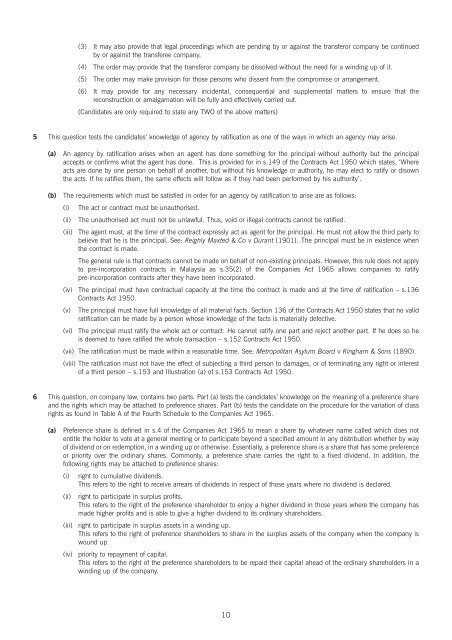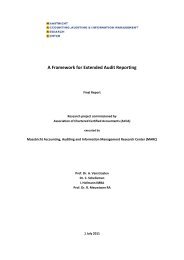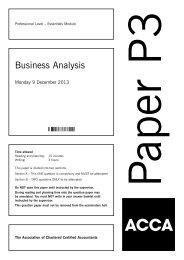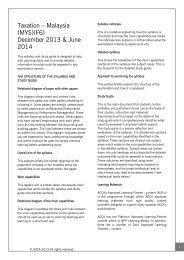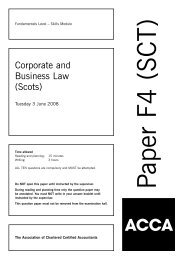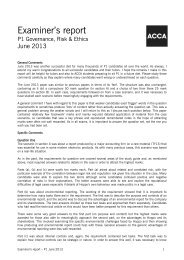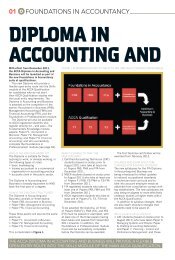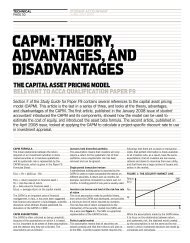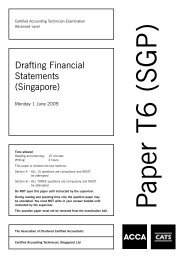June 2009 Answers - ACCA
June 2009 Answers - ACCA
June 2009 Answers - ACCA
Create successful ePaper yourself
Turn your PDF publications into a flip-book with our unique Google optimized e-Paper software.
(3) It may also provide that legal proceedings which are pending by or against the transferor company be continued<br />
by or against the transferee company.<br />
(4) The order may provide that the transferor company be dissolved without the need for a winding up of it.<br />
(5) The order may make provision for those persons who dissent from the compromise or arrangement.<br />
(6) It may provide for any necessary incidental, consequential and supplemental matters to ensure that the<br />
reconstruction or amalgamation will be fully and effectively carried out.<br />
(Candidates are only required to state any TWO of the above matters)<br />
5 This question tests the candidates’ knowledge of agency by ratification as one of the ways in which an agency may arise.<br />
(a) An agency by ratification arises when an agent has done something for the principal without authority but the principal<br />
accepts or confirms what the agent has done. This is provided for in s.149 of the Contracts Act 1950 which states, ‘Where<br />
acts are done by one person on behalf of another, but without his knowledge or authority, he may elect to ratify or disown<br />
the acts. If he ratifies them, the same effects will follow as if they had been performed by his authority’.<br />
(b) The requirements which must be satisfied in order for an agency by ratification to arise are as follows:<br />
(i) The act or contract must be unauthorised.<br />
(ii) The unauthorised act must not be unlawful. Thus, void or illegal contracts cannot be ratified.<br />
(iii) The agent must, at the time of the contract expressly act as agent for the principal. He must not allow the third party to<br />
believe that he is the principal. See: Keighly Maxted & Co v Durant [1901]. The principal must be in existence when<br />
the contract is made.<br />
The general rule is that contracts cannot be made on behalf of non-existing principals. However, this rule does not apply<br />
to pre-incorporation contracts in Malaysia as s.35(2) of the Companies Act 1965 allows companies to ratify<br />
pre-incorporation contracts after they have been incorporated.<br />
(iv) The principal must have contractual capacity at the time the contract is made and at the time of ratification – s.136<br />
Contracts Act 1950.<br />
(v) The principal must have full knowledge of all material facts. Section 136 of the Contracts Act 1950 states that no valid<br />
ratification can be made by a person whose knowledge of the facts is materially defective.<br />
(vi) The principal must ratify the whole act or contract. He cannot ratify one part and reject another part. If he does so he<br />
is deemed to have ratified the whole transaction – s.152 Contracts Act 1950.<br />
(vii) The ratification must be made within a reasonable time. See: Metropolitan Asylum Board v Kingham & Sons (1890).<br />
(viii) The ratification must not have the effect of subjecting a third person to damages, or of terminating any right or interest<br />
of a third person – s.153 and Illustration (a) of s.153 Contracts Act 1950.<br />
6 This question, on company law, contains two parts. Part (a) tests the candidates’ knowledge on the meaning of a preference share<br />
and the rights which may be attached to preference shares. Part (b) tests the candidate on the procedure for the variation of class<br />
rights as found in Table A of the Fourth Schedule to the Companies Act 1965.<br />
(a) Preference share is defined in s.4 of the Companies Act 1965 to mean a share by whatever name called which does not<br />
entitle the holder to vote at a general meeting or to participate beyond a specified amount in any distribution whether by way<br />
of dividend or on redemption, in a winding up or otherwise. Essentially, a preference share is a share that has some preference<br />
or priority over the ordinary shares. Commonly, a preference share carries the right to a fixed dividend. In addition, the<br />
following rights may be attached to preference shares:<br />
(i) right to cumulative dividends.<br />
This refers to the right to receive arrears of dividends in respect of those years where no dividend is declared.<br />
(ii) right to participate in surplus profits.<br />
This refers to the right of the preference shareholder to enjoy a higher dividend in those years where the company has<br />
made higher profits and is able to give a higher dividend to its ordinary shareholders.<br />
(iii) right to participate in surplus assets in a winding up.<br />
This refers to the right of preference shareholders to share in the surplus assets of the company when the company is<br />
wound up.<br />
(iv) priority to repayment of capital.<br />
This refers to the right of the preference shareholders to be repaid their capital ahead of the ordinary shareholders in a<br />
winding up of the company.<br />
10


